 Leading Blog | Posts by Month |
 Leading Blog | Posts by Month |
04.30.07

A Pyrrhic Victory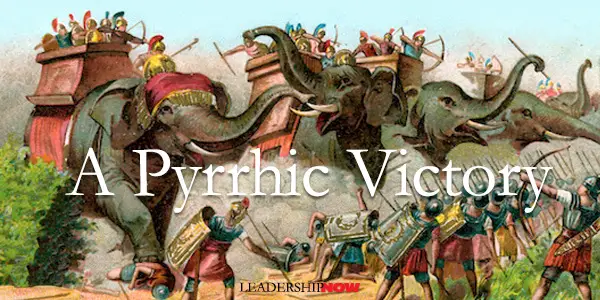
IN 279 BC, 40,000 Romans battled for two days against 40,000 Greeks and their 20 war elephants in the hills of southeastern Italy near Asculum. The Greeks were under the command of King Pyrrhus. According to the great Carthaginian general Hannibal, he was the greatest general the world had seen since Alexander the Great. The first day of battle accomplished little. The two sides fought an indecisive battle. Over the next day, the Romans were forced back, but Pyrrhus was unable to capture their camp. Finally, at the end of the day, seeing the futility of continuing, the armies separated. The Romans had lost 6,000 men and the Greeks 3,500 including many officers. It was a costly victory for Pyrrhus. At dawn the next morning, in response to congratulations for his victory over the Romans, the historian Plutarch relates that Pyrrhus confessed, “one more such victory would utterly undo him.” The battle had been won at too high a cost. Although they never defeated Pyrrhus on the field, the Romans were able to win a war of attrition. Henceforth, no soldier would cheer a Pyrrhic victory. We, too, have battles to fight from time to time. Some battles though can be won at too high a cost. As Pyrrhus admitted, some battles can literally undo us. If we are not careful we can let situations and our ego get the best of us. We can undermine our purpose of serving and lifting up those we lead. Winning an argument can destroy our influence and cost us a relationship. In Pearls of Wisdom, Joyce Brothers wrote, “There is a rule in sailing where the more maneuverable ship should give way to the less maneuverable craft. I think this is sometimes a good rule to follow in human relationships as well.” Relationships are what leadership is all about. As the leader, we are the more maneuverable ship. Being immovable or stubborn, just because we are right, doesn’t move us closer to our goal. It is up to us to step back, bend, or give way and let the other person pass. Later we might try a different tack if it is really that important to make the point. Hitting a difficult person head on is rarely the appropriate action. When we come up against conflict, we must ask ourselves if winning this one is really that important. How will winning affect my ability to work with this person? What is motivating me to win? We don’t need to fight every battle. We should choose battles that in the final analysis will strengthen our relationships and improve our effectiveness.
Posted by Michael McKinney at 09:53 AM
04.25.07

The Acid Test of Leadership If leadership is about influence then the acid test of leadership must be the following question: If you were stripped of your title – the politics of leadership, the power to punish and reward people – would they still follow you? Would you still get results from them? It's good to ask yourself this question periodically and adjust your approach accordingly. 
Posted by Michael McKinney at 12:18 AM
04.23.07

Former Russian Leader Boris Yeltsin Dead at 76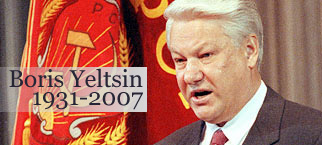 The flamboyant Boris Yeltsin (1931-2007), died today of heart failure at the age of 76. Russia's first freely elected president has been credited with engineering the final collapse of the Soviet Union and pushing the country into democracy and a market economy. The flamboyant Boris Yeltsin (1931-2007), died today of heart failure at the age of 76. Russia's first freely elected president has been credited with engineering the final collapse of the Soviet Union and pushing the country into democracy and a market economy.
The Financial Times comments, “Boris Yeltsin had the physical and moral strength to bear on his shoulders the colossal burden of a country in a ferment of transition, its economy struggling with the twin tasks of discarding a tenacious old system and adjusting to an unfamiliarly fast-moving new one. At the beginning of his rule he was able to grasp, either instinctively or through a quick intelligence, much of what was required.” His contemporaries may judge him a bit harsher remembering him for being out of touch and hesitant to act against crime and corruption. Yet on the international stage, many will remember when in August 1991, he climbed on top of a tank to successfully stare down a coup attempt against Gorbachev. His open defiance clearly marked the end of the USSR. 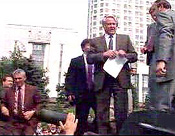 Yeltsin’s leadership by and large, did not rely on status and fear. Very much the strategic leader, he developed a populist style. He had an ability to connect with the Russian people. It is from here that he derived much of his power. His problem was that didn’t really didn’t know what to do with the power once he got it. The Economist concludes, “The former construction engineer was not a great builder of institutions; the democracy was flawed. But he had the right instincts. For liberating Russians from the yoke of the one-party state and the planned economy, he deserves immense gratitude. Yet his nepotistic and capricious rule spawned colossal lawlessness and corruption, paving the way for his authoritarian successor, Vladimir Putin.” World Reaction to His Death: "Russia has a lost a brilliant reformer. No-one has done as much for Russia as Yeltsin did. He was a unique person and absolutely Russian in his soul, in his impulsiveness and in his intellect." "He is best remembered when standing up to the coup d'etat aimed at restoring a dictatorial regime in Russia. With great personal courage he had merit in defending freedom. The Commission sends its condolences to Mr Yeltsin's family, the Russian authorities and the people of Russia." Boris Yeltsin in his own words:
Posted by Michael McKinney at 10:52 AM

Google Ranked the World’s Most Powerful Brand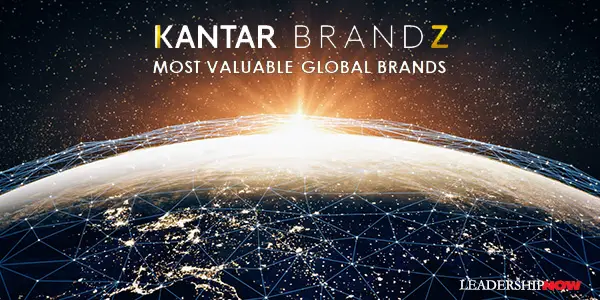

They found that the value of international brands including BMW ($25,751 million), L'Oreal ($12,303 million) and Zara ($6,469 million) benefited from growth in emerging markets known as BRICs (Brazil, Russia, India and China). These brands' ability to balance "foreign-ness" and localization is what allowed them to successfully penetrate the BRIC markets and attract the rising class of disposable income-rich consumers. In addition, delivering on the promise of environmental responsibility helped boost the value of major brands including BP ($5,931 million), Shell ($4,679) and Toyota ($ 33,427 million). Commenting on this year's BRANDZ™ Top 100 ranking, Eileen Campbell, global CEO of Millward Brown said: "There are tons of actionable insights that can be derived from these rankings. They prove that a blend of good business leadership, responsible financial management and powerful marketing are an unbeatable combination that can be leveraged to create and grow corporate wealth." Strong brands have the power to create business value. They impact much more than revenues and profit margins. Strong brands create competitive advantages by commanding a price premium and decrease the cost of entry into new markets and categories. They reduce business risk and help attract and retain talented staff.
Posted by Michael McKinney at 09:23 AM
04.21.07

Fast Company Interview with Sir James Dyson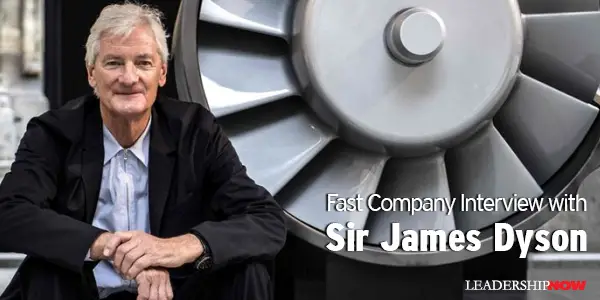
THE discussions on Appreciative Intelligence and Charles Pellerin’s views on the social leadership aspects of project management, parallel a good short interview in the May issue of Fast Company with Sir James Dyson. Here are a couple of his comments: FC: You once described the inventor's life as "one of failure." How so?
Posted by Michael McKinney at 11:13 PM
04.20.07

Charles Pellerin on Project Management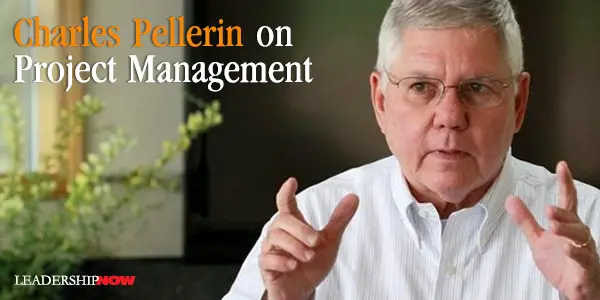
APPRECIATIVE INTELLIGENCE—the ability to perceive the positive inherent generative potential within the present—is an important component to develop as part of organizational culture. AI contributes to a high incidence of innovation and creativity and the potential development of previously unnoticed strengths in people. This happens by the actions of leaders at all levels, to encourage people to look at everyday issues—the commonplace—in a new way; by telling a new story. 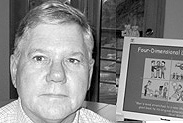 Can you explain what you mean by "social issues," and how they relate to leadership? This would help to explain the recent experiment reported in the Washington Post by Gene Weingarten to discover if violinist Josh Bell—and his Stradivarius—could stop busy commuters in their tracks. Surprisingly, he did not. If our story is to ignore street musicians and includes the belief that no famous musician would ever do it, then we will ignore street musicians and we will not scan the streets looking for our favorite artists. (If you haven’t read it yet, do so. It’s a great story.) Pellerin has been developing since his retirement from NASA in 1995, a leadership/culture assessment and learning system called "Four-Dimensional (4-D) Leadership." He states, “We began with workshops, and then added coaching, and now have Web-based diagnostics customized for NASA projects. Simply put, we make three measurements in each of the social dimensions -- directing, visioning, relating and valuing—that we believe are fundamental to effective leadership and efficient cultures. “I truly believe that we can identify and address the root cause of most project difficulties. That's my story. And many of the projects I'm working with are choosing to run that story as well -- because they see results. You know, no story is "good" or "bad." Some just get you the results you want and some don't.”
Posted by Michael McKinney at 07:21 AM
04.19.07

Appreciative Intelligence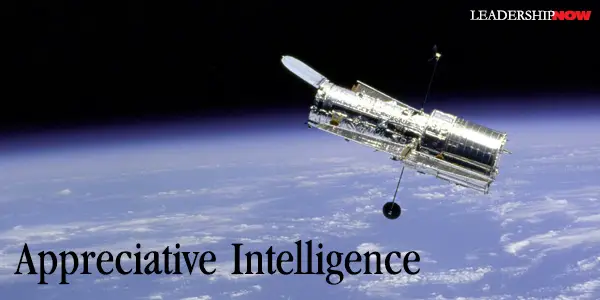
IN April 1990, shuttle Discovery launched the Hubble Space Telescope into its planned orbit. However, within weeks it became obvious that there was a serious problem with the primary mirror. Authors Tojo Thatchenkery and Carol Metzker describe the events that followed in their book Appreciative Intelligence: Seeing the Mighty Oak in the Acorn. Congress demanded an explanation for the failure. The project and its creators became the butt of late-night television jokes. Stress was high among NASA engineers, as were health problems. “It was traumatic,” said Charlie Pellerin, the former director of NASA’s astrophysics division, who oversaw the launch of the Hubble. Nobody could see how to fix the problem, which many seemed afraid even to address. Appreciative Intelligence is defined as “the ability to perceive the positive inherent generative potential within the present.” More simply, it is “the ability to see the mighty oak in the acorn. It is the ability to reframe a given situation (or person), to appreciate its positive aspects, and to see how the future unfolds from the generative aspects of the current situation.” These three characteristics form the foundation of appreciative intelligence. Reframing is about shifting reality by choosing what feedback we will ignore and what feedback we will pay attention to. Appreciating the positive is the ability to see the positive aspects of any given situation. To see how the future unfolds from the present refers to the ability to see what can be done instead of what can’t. Appreciative intelligence is the mindset that allows you to step back and access the situation and move forward instead of being thwarted by circumstances. Appreciative intelligence can, of course, be developed by consciously expanding your responses to situations as they occur. Asking yourself different questions by questioning your assumptions (what you know to be right), looking for positive and different meaning in what you experience, and becoming what Saul Bellow calls a first-class noticer, will help you improve your appreciative intelligence.Additionally, keep in mind the AI qualities of persistence, conviction that your actions matter, tolerance for uncertainty, and irrepressible resilience. As these qualities develop, so too will your creativity and success in finding a resolution to the issues you face. Appreciative Intelligence: Seeing the Mighty Oak in the Acorn provides in more detail what I have outlined here.
Additional Interest:

Posted by Michael McKinney at 07:42 AM
04.17.07

First, Take a Look at Yourself When things aren't going right we tend to look around for the cause of the problem and blame others. What we should be doing is looking at ourselves. One skunk's Ah-Ha experience: "I always thought they didn't want me around because I was a skunk, well...you know it turns out they didn't want me around because I was a jerk."
Posted by Michael McKinney at 12:06 AM
04.16.07

Neuroscience in the Workplace PodcastIn this recording, David Rock speaks with John Case, CEO of Electrolux Home Care Products North America about how neuroscience links to the performance strategies implemented in his organization. John first heard David speak in Las Vegas and found that neuroscience helped to explain why his business strategies have worked.
Posted by Michael McKinney at 08:44 AM
04.14.07

Snooze You Lose? Like me, you probably worked right through National Sleep Awareness Week (March 5-11, 2007) this year. For many, lack of sleep is a source of pride. It seems to imply that what we are doing is too important for mere mortals. Getting the proper amount of sleep isn’t equated with a go-getter. Getting caught napping is downright embarrassing. Yet research shows that sleep is one of the most important activities of the productive person. Professor Sara Mednick in Good Magazine asks, “Can afternoon naps save your life?” Apparently, they can. “Scientists are discovering more and more evidence to suggest that a midday rest can improve your alertness, cognition, mood, cardiac health, and weight.” Sleep affects your ability to learn and memory. Research would suggest that the more important you are the more sleep you should get. You need the extra time for your mind to process all you learn and do in a day. Mednick continues:  We are in the midst of a fatigue epidemic that affects health, safety, productivity, and the bottom line. Sleep loss has been shown to increase our inflammatory and stress responses, which naps can bring back to normal levels.The National Sleep Foundation recommends an average of 7 to 9 hours of sleep per night for adults. Here are some tips for good sleep:
The National Sleep Foundation reports that "a team of American and Greek researchers undertook an epidemiological study of 23,681 Greek adults with no history of heart disease, stroke, or cancer. They asked participants about the frequency and duration of their naps and about other variables that might affect heart health and found that those participants who napped regularly (three or more times a week, for 30 minutes or more) had a 37% lower risk of dying from heart disease. This finding was especially true for working men. "Oftentimes getting adequate sleep at night is challenging. Napping offers a way to augment nighttime sleep, increase alertness, and possibly lower stress levels." Take a nap!
Posted by Michael McKinney at 09:06 PM
04.13.07

The Courage to Initiate Relying on a single person to lead the charge reflects a dysfunctional concept of leadership. It sets up expectations that can’t be met. No one person can do everything. No wise leader would. Leadership is a group activity. There is an implied interdependency. Relying on a single person to lead the charge reflects a dysfunctional concept of leadership. It sets up expectations that can’t be met. No one person can do everything. No wise leader would. Leadership is a group activity. There is an implied interdependency.
Everyone has the capacity for leadership. Often what most people lack is the courage—the courage to initiate. Initiative means moving outside your comfort zone. It means seeking out opportunities and being willing to act. Nearly everyone can see a need or see where changes need to be made. What is uncommon though, are people who are willing to take the initiative; to do something about it. Leadership is not always seen in the brightest or the most talented, but it is always found in the courageous. You may not be able to be the CEO but you should think as the CEO. The CEO mindset involves taking the time to think about the forces that are shaping the future of both you and your organization. Managing yourself in this way is important not only to the organization but also to your own personal development.
Posted by Michael McKinney at 08:35 AM
04.12.07

The NeuroLeadership Summit and Why It Matters to Executives
The First Global NeuroLeadership Summit is about a month away. The organizers have decided to film the Summit. This will allow the filming of several important neuroscientists—such as Matt Lieberman, Stellan Ohlsson and Kevin Ochsner—who are important to the field but are unable to attend the Summit. This film will be available online after the Summit. The Summit will focus on the latest discoveries in neuroscience and how those discoveries can be used to help organizations:
A new article, Why Neuroscience Matters to Executives by David Rock and Jeffrey Schwartz is available on the strategy+business web site. Here are a few key thoughts from that article: The study of neuroscience has provided us with a deeper understanding of why people find change so unsettling....The more we understand the phenomenon of change, the more effectively we can manage it. Neuroscience shows us why some common practices work well, such as allowing people to take ownership of a new initiative. It also explains why some don’t succeed. For example, using threats or incentives to implement organizational change is rarely sustainable.
Posted by Michael McKinney at 12:12 AM
04.11.07

A Tutorial On Letter Writing
 To — Lith
Posted by Michael McKinney at 09:19 AM
04.08.07

Lee Iacocca’s 9 C's of Leadership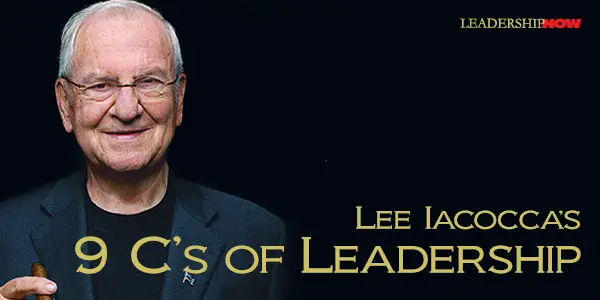 LEE IACOCCA'S polemic,Where Have All the Leaders Gone?, will be released on April 17th. In the meantime you can read chapter one Had Enough? in our Reading Room. Included in chapter one he presents his 9 C's of Leadership you will find briefly illuminated below:
LEE IACOCCA'S polemic,Where Have All the Leaders Gone?, will be released on April 17th. In the meantime you can read chapter one Had Enough? in our Reading Room. Included in chapter one he presents his 9 C's of Leadership you will find briefly illuminated below:
1. A leader has to show CURIOSITY. He has to listen to people outside of the "Yes, sir" crowd in his inner circle. He has to read voraciously because the world is a big, complicated place. If a leader never steps outside his comfort zone to hear different ideas, he grows stale. If he doesn't put his beliefs to the test, how does he know he's right? The inability to listen is a form of arrogance. It means either you think you already know it all, or you just don't care. 2. A leader has to be CREATIVE, go out on a limb, be willing to try something different. You know, think outside the box. Leadership is all about managing change -- whether you're leading a company or leading a country. Things change, and you get creative. You adapt. 3. A leader has to COMMUNICATE. I'm not talking about running off at the mouth or spouting sound bites. I'm talking about facing reality and telling the truth. 4. A leader has to be a person of CHARACTER. That means knowing the difference between right and wrong and having the guts to do the right thing. Abraham Lincoln once said, "If you want to test a man's character, give him power." 5. A leader must have COURAGE. I'm talking about balls. (That even goes for female leaders.) Swagger isn't courage. Tough talk isn't courage. Courage is a commitment to sit down at the negotiating table and talk. 6. To be a leader you've got to have CONVICTION -- a fire in your belly. You've got to have passion. You've got to really want to get something done. 7. A leader should have CHARISMA. I'm not talking about being flashy. Charisma is the quality that makes people want to follow you. It's the ability to inspire. People follow a leader because they trust him. That's my definition of charisma. 8. A leader has to be COMPETENT. That seems obvious, doesn't it? You've got to know what you're doing. More important than that, you've got to surround yourself with people who know what they're doing. 9. You can't be a leader if you don't have COMMON SENSE. THE BIGGEST C IS CRISIS. Leaders are made, not born. Leadership is forged in times of crisis. 
Posted by Michael McKinney at 01:46 PM
04.07.07

Henry Ford Dies Today in 1947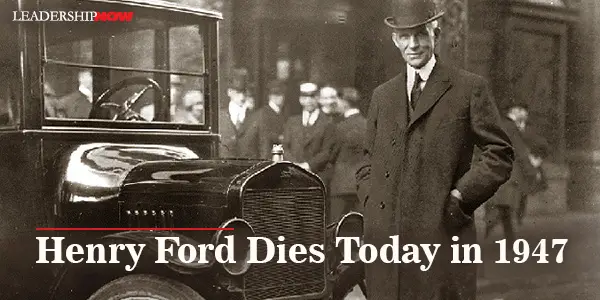
SIXTY YEARS AGO today Henry Ford died in his bedroom in Dearborn, Michigan. He was 83. Will Rogers had remarked, "It will take a hundred years to tell whether he helped us or hurt us, but he certainly didn't leave us where he found us." Ford, of course, revolutionized the manufacturing process, yet probably one of his greatest contributions was economic. His insistence that the company's future lay in the production of affordable cars for a mass-market led him—often at odds with his investors—to lower unit costs and to implement a highly criticized minimum wage scheme. Ford's quest to make the automobile accessible to all, helped to change the make-up of American society in general. As Lee Iacocca wrote in Time magazine, “[I]f it hadn't been for Henry Ford's drive to create a mass market for cars, America wouldn't have a middle-class today.”
Posted by Michael McKinney at 10:08 PM
04.04.07

Tyranny of the Urgent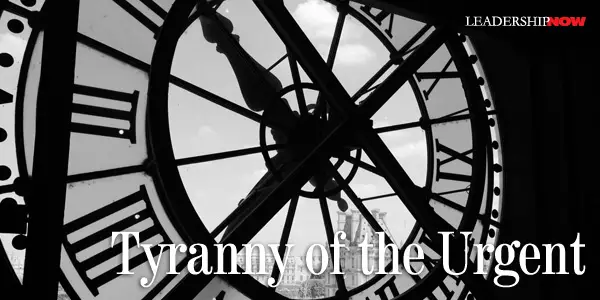
IT IS EASY to succumb to the tyranny of the urgent. There is always something competing for our attention. Worse still, we might find we have to deal with what Michael Watkins calls pyromaniacs—those people like to create fires for you to put out. The only way out is to get some perspective. In White Hat Leadership, author Ty Warren writes about the importance of making time to disengage: Part of preparing to lead is recognizing when to step away to recharge. Most of us have experienced the benefits of taking time away from the office (or family) for a few days, then returning with new energy and a better perspective. The urgent will always be with us. How we handle it will determine how effective we are. Once we begin to let the urgent take over the important we loose perspective and get sucked into a cycle that perpetuates the problem and drains us. Without direction, we mistakenly find ourselves trying to compensate by going twice as fast. We must take time out to think. The perspective you gain will help you to handle everything you do better. Are you part of the problem? Do you create fires for others to put out? Take the “Are you a pyromaniac?” quiz.
Posted by Michael McKinney at 04:51 PM
04.02.07

Talent is Never Enough“Talent is cheaper than table salt. What separates the talented individual from the successful one is a lot of hard work.”In John Maxwell’s valuable new book, Talent is Never Enough, he cites Peter Drucker on effectiveness, "There seems to be little correlation between a man's effectiveness and his intelligence, his imagination, or his knowledge...Intelligence, imagination, and knowledge are essential resources, but only effectiveness converts them into results. By themselves, they only set limits to what can be contained." "If talent were enough," Maxwell writes, "then the most effective and influential people would always be the most talented ones. But that is often not the case." Talent might get you noticed but it won’t keep you there. Success requires hard work. To achieve the effectiveness that Drucker is talking about and to turn talent into results is matter of choice. Maxwell writes, “The key choices you make—apart from the natural talent you already have—will set you apart from others who have talent alone.” He has identified 13 choices you can make to maximize your talent. These choices form the framework of his book: • Belief lifts your talent: Lack of belief in yourself can act as a ceiling on talent. • Passion energizes your talent: A passionate person with limited talent will outperform a passive person who possesses greater talent. • Initiative activates your talent: Socrates said, “To move the world we must first move ourselves.” • Focus directs your talent: Attempting everything, like attempting nothing will suck the life out of you. • Preparation positions your talent: Becoming more intentional. You can claim to be surprised once; after that, you’re unprepared. • Practice sharpens your talent: Practice demands discipline and embracing change. • Perseverance sustains your talent: People who display perseverance keep a larger vision in mind as they toil away at their craft or profession. • Courage tests your talent: As we develop our talent and grow to our potential we will be tested continually. Courage is an everyday virtue. • Teachability expands your talent: Teachability is not so much about competence and mental capacity as it is about attitude. It is the desire to listen, learn, and apply. Talented people can be the toughest to teach because they often think they know it all. It’s a problem of pride. • Character protects your talent: People cannot climb beyond the limitations of their character. Talented people are sometimes tempted to take shortcuts. Character prevents that. • Relationships influence your talent: Life is too short to spend it with people who pull you in the wrong direction. And it’s too short not to invest in others. Your relationships will define you. • Responsibility strengthens your talent: Responsibility not only improves your life, but also will improve the life of those around you. • Teamwork multiplies your talent: Teamwork divides the effort and multiples the effect. “Make these choices,” Maxwell encourages, “and you can become a talent-plus person. If you have talent, you stand alone. If you have talent plus, you stand out.”
Posted by Michael McKinney at 09:54 AM
04.01.07

Leadership Books: April 2007Here's a look at some of the best leadership books to be released in April.    
Posted by Michael McKinney at 12:44 AM
|
BUILD YOUR KNOWLEDGE


How to Do Your Start-Up Right STRAIGHT TALK FOR START-UPS 
Grow Your Leadership Skills NEW AND UPCOMING LEADERSHIP BOOKS 
Leadership Minute BITE-SIZE CONCEPTS YOU CAN CHEW ON 
Classic Leadership Books BOOKS TO READ BEFORE YOU LEAD |
|